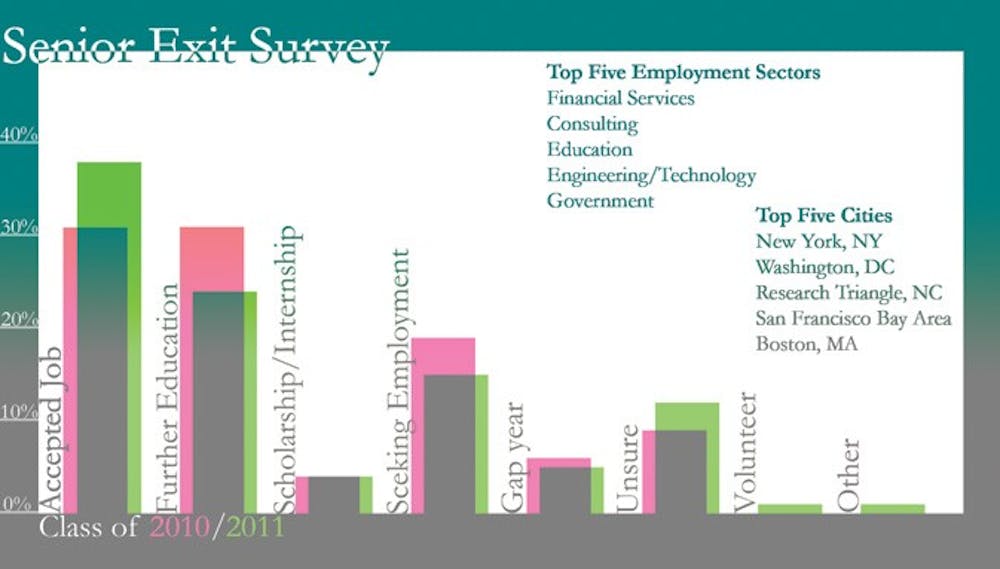After several years of decline, job prospects for Duke’s graduating seniors are returning to pre-recession levels.
According to the Career Center’s Senior Exit Survey, 38 percent of the Class of 2011 had accepted jobs by April—this is a 7 percent increase from last year and is a near return to Spring 2008—just before the econmic downturn when 39 percent of seniors reported that they had taken offers.
Additionally, the percentage of students still seeking jobs fell from 19 percent in 2010 to 15 percent this year.
Students, however, still need to adjust their job searches in order to work with a still recovering market, said William Wright-Swadel, Fannie Mitchell executive director of career services at Duke.
“I would suggest to students that when a market is tough... students need to really broaden the way they’re looking and consider the kinds of options they have for searching,” Wright-Swadel added.
The percentage of students who reported that they were pursuing further education dipped from 31 to 24 percent this year, though Wright-Swadel noted that this shift may have been due to a change in the survey’s wording. Previous surveys asked about students’ anticipated post-graduation plans, but the survey administered in April asked about students’ immediate post-graduation plans.
“When you change the wording of a question, you often change the way that people answer it,” Wright-Swadel said. “We’ll have to wait a year to see trend data.”
The response rate for this year’s survey was 81 percent—a 3 percent decrease from last year.
The survey also asked students what employment sectors they are entering and where they plan to live after graduation.
Most seniors reported that they would pursue financial services, consulting and education, and their top three cities were New York City, Washington, D.C. and the Research Triangle area.
Emma Rasiel, director of the Financial Education Partnership and associate professor of the practice in economics, said she was not surprised that financial services were the top employment sector for the Class of 2011. Finance has the most opportunities for students seeking jobs in big business, she said, but warned that future prospects may not be as lucrative.
“I think that the Class of 2012 may have a little bit harder time finding jobs in finance because of the economic downturn,” Rasiel said. “Especially in an economy like this one… I would encourage students to look at non-trade ways of getting into finance [like] corporate finance.”
Wright-Swadel said students should broaden their searches to include similar careers related to their areas of interest and not limit themselves to a specific geographic region.
“Though it may be more challenging to get the job in New York, [similar] opportunities will exist in other places,” he said.
He added that the results also may not fully reflect student placement because the survey was administered prior to graduation.
“Some have not received their [offers] by the survey,” Wright-Swadel said. “Not everyone has made a complete commitment—they’re still in the decision making loop.”
One graduate who found employment soon after the survey was Chris Perry, Pratt ’11, who said he attributes his success to luck.
“I didn’t do myself many favors by waiting until after graduation to start applying to things, but I was more focused on actually graduating during the semester,” Perry said. “I actually only applied to maybe five jobs before I got the one that I have now.”
Amanda Robison, Pratt ’11, found a job in technology services before graduation. Robison said she suggests students expand their search beyond eRecruiting—an online career and internship database.
“A lot of people seem to limit themselves to eRecruiting—it’s not worth it,” she said. “One of the biggest problems is that everyone applying is from Duke. When you aren’t competing against other Duke students, the name really means something.”
Wright-Swadel noted a 3 percent increase in students who reported that they were unsure of their post-graduation plans, up from 9 percent in 2010 to 12 percent this year. He encouraged undecided students to confront their potential post-graduation options before they leave Duke.
“Frankly [the Career Center is] very interested in working with students who are undecided,” he said. “Students have a lot of advice available on campus. What’s critical is that one takes steps to become undecided, and while you’re here is a better time to do that than after graduation.”
Get The Chronicle straight to your inbox
Signup for our weekly newsletter. Cancel at any time.

